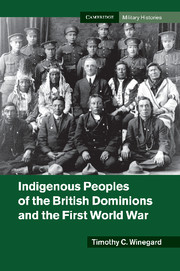Book contents
- Frontmatter
- Contents
- Figures
- Maps
- Tables
- Acknowledgements
- Note on the text
- Introduction
- 1 Colonization and the settler state
- 2 Racial constructs and martial theories
- 3 Precedents of military pragmatism
- 4 Dominion defence acts
- 5 1914: Subjugated spectators
- 6 1915–1916: King and country call
- 7 1917–1918: All the King’s men
- 8 Indigenous soldiers
- 9 The home front
- 10 Peace with prejudice
- Conclusion
- Bibliography
- Index
- References
Conclusion
Published online by Cambridge University Press: 05 June 2014
- Frontmatter
- Contents
- Figures
- Maps
- Tables
- Acknowledgements
- Note on the text
- Introduction
- 1 Colonization and the settler state
- 2 Racial constructs and martial theories
- 3 Precedents of military pragmatism
- 4 Dominion defence acts
- 5 1914: Subjugated spectators
- 6 1915–1916: King and country call
- 7 1917–1918: All the King’s men
- 8 Indigenous soldiers
- 9 The home front
- 10 Peace with prejudice
- Conclusion
- Bibliography
- Index
- References
Summary
The pragmatic realization of the need for manpower, allied with the October 1915 requests of the imperial government, provided for the military inclusion of Dominion indigenes during the First World War. Had the war been short and limited in its requirements for men and materials, indigenes would have remained subjugated spectators. The First World War, however, was a global conflict and encompassed the terrain and populations of peoples that belonged, willingly or otherwise, to established European empires; thus, these indigenous peoples were solicited to participate. Many eagerly embraced the opportunity to serve as equals within Dominion forces, while demonstrating their loyalty to the empire and their home nations.
Nevertheless, racial considerations, including probable outcomes, were foremost in all decisions pertaining to the use of indigenous men in a military capacity. The military inclusion of indigenes was never intended to outlast the war, as defence acts were not formally altered, but rather, were ignored to meet military exigencies, chiefly the need for manpower. All facets of their military service were carefully weighed and applied, so as not to upset the existing racial, social and political realities of Dominion societies, while at the same time satisfying strategic war objectives – greater autonomy, sub-imperialism of the Antipodes and South Africa, and access to enhanced economic markets for all Dominions. In a war of attrition, providing manpower for national expeditionary forces, to supplement the senior British Expeditionary Force, was the most conspicuous avenue to achieve these ambitions.
- Type
- Chapter
- Information
- Publisher: Cambridge University PressPrint publication year: 2011



